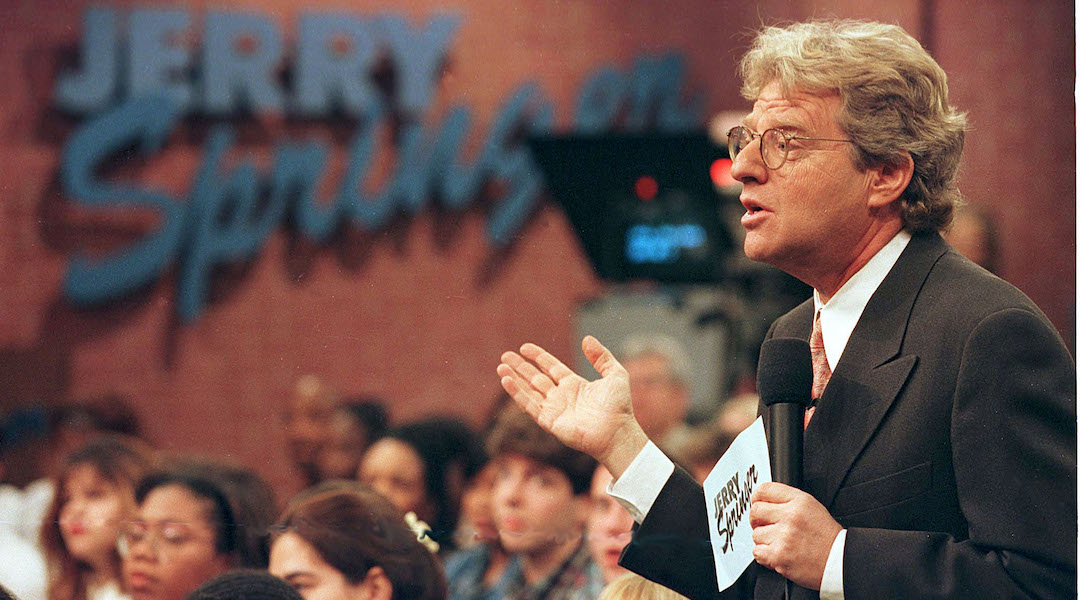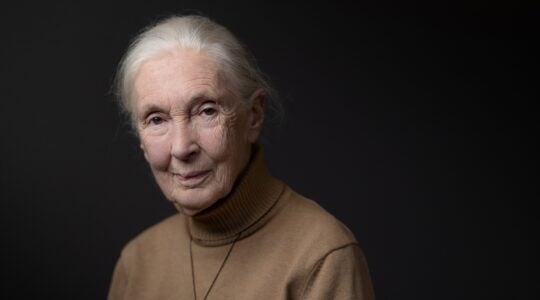(JTA) — Jerry Springer, the son of Jewish refugees who set aside a promising political career to become the ringleader of a circus-like syndicated talk show featuring feuding couples, angry exes and frequent fisticuffs, died Thursday morning at his home in the Chicago area.
A family spokesperson told TMZ that Springer, who was 79, had been battling a “brief illness.”
Over nearly 5,000 episodes beginning in 1991 and lasting until 2018, Springer transformed daytime television conventions with a program designed to encourage conflict among its guests. Where rivals like Oprah Winfrey and Phil Donahue were interviewing celebrities and tackling more serious issues, Springer would bring on everyday people and pit them against one another in shows about incest, adultery and polyamory.
In an interview last year, he acknowledged the critics — including prominent British rabbis — who decried his version of “tabloid television” and said it had fueled divisions in society. “I just apologize,” he said. “I’m so sorry. What have I done? I’ve ruined the culture.”
Springer’s path to television notoriety was not preordained. He was born in a London tube station in 1944 during a German bombing raid to parents, Richard and Margot Springer, who were German-Jewish refugees from the Nazis. They escaped from what was then Prussia (now present-day Poland) and arrived in Britain in 1939 just before the outbreak of World War II. Twenty-seven other members of Springer’s family were killed in the Holocaust.
The family moved to the United States in 1949, settling in the Kew Gardens neighborhood of Queens in New York City. Springer’s first career after earning a law degree from Northwestern University was in politics. He worked on the 1968 presidential campaign of Robert F. Kennedy that ended with Kennedy’s assassination, then ran a failed campaign for U.S. Congress in 1970 before being elected to Cincinnati’s City Council in 1971.
In 1977, Springer was elected mayor of Cincinnati and, under a power-sharing arrangement between his Democratic Party and a third party, served a single one-year term — by most accounts responsibly and effectively.
After serving as mayor, he anchored the news for the NBC affiliate in Cincinnati for 10 years before making the leap to syndicated TV.
“The Jerry Springer Show” started with more high-minded intentions before, as ratings dipped, he embraced the sensational. The television series was produced and aired by NBCUniversal and CW, and earned Springer a fortune: In 2000, Broadcasting & Cable reported, Springer was given a five-year, $30 million contract extension paying him $6 million per year.
The show’s high ratings and queasy critical reception (“family values” groups such as the Parents Television Council and the American Family Association called for boycotts) also obscured his own sober and tragic Jewish family story.
In 2008, Springer investigated his relatives’ fates on the BBC1 program “Who Do You Think You Are?” He broke down in tears at the train station where his maternal grandmother was sent to her death in the Chelmno extermination camp.
In 2015, Springer visited London to support a British Holocaust refugee project preserving the archive of what was originally known as the Central British Fund for German Jewry and later World Jewish Relief. The group helped tens of thousands of European Jews escape the Nazis to Britain in the 1930s and 1940s — including thousands of children as part of the Kindertransport and Springer’s parents.
“We are immensely grateful to Jerry Springer for giving his time to us and supporting our archives,” World Jewish Relief vice-chair Linda Rosenblatt said at the time.
“I was deeply touched when I received the records of my parents’ immigration,” Springer said. “These papers are a piece of my family history which I will treasure forever.”
After his talk show went off the air in 2018, he attempted a comeback with a courtroom show, “Judge Jerry.” It ran for three seasons. His last TV appearance came last season on “The Masked Singer,” where he performed as “The Beetle,” singing a Frank Sinatra tune.
In 2018, an off-Broadway version of the musical “Jerry Springer: The Opera,” opened in New York. Originally staged in London 15 years earlier, it featured songs celebrating the Springer ethos: “Fat people fighting / Open crotch sighting / Pimps in bad suits / Mothers who are prostitutes.” Nevertheless, a reviewer said the musical was “surprisingly free of the sometimes savage cruelty that distinguished the [talk] show from its wimpy competitors.”
In 2009, Springer joined the cast of the Broadway revival of the musical “Chicago,” playing the part of a slick lawyer whose adulterous client is facing charges in a tawdry murder case. It echoed a notorious incident from the real-life “Springer” show: In 2002, a man was convicted of killing his ex-wife hours after they and another woman were featured on an episode about love triangles.
In a 2004 interview with the public radio program “This American Life,” Springer put his tumultuous career in perspective.
“Well, we certainly made a difference in television. I’m not sure people are happy about it,” he told Alex Blumberg. “I try not to think about it too much. Life is what it is. And you take what’s handed and you work as hard as you can and, hopefully, you’ll be successful. But I just don’t spend too much time worrying about that. I do my show. I’ve always said it’s a stupid show. I’ve had a wonderful life because of it and all that, but I’ve never, for a second, thought that it’s important. It’s trivial. It’s chewing gum, and I recognize that.”
According to The Hollywood Reporter, his survivors include his wife, daughter, son-in-law, grandson and sister.
JTA has documented Jewish history in real-time for over a century. Keep our journalism strong by joining us in supporting independent, award-winning reporting.






